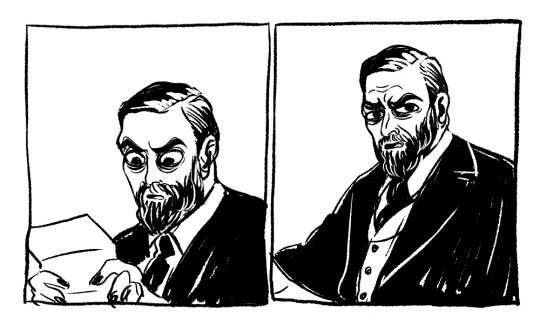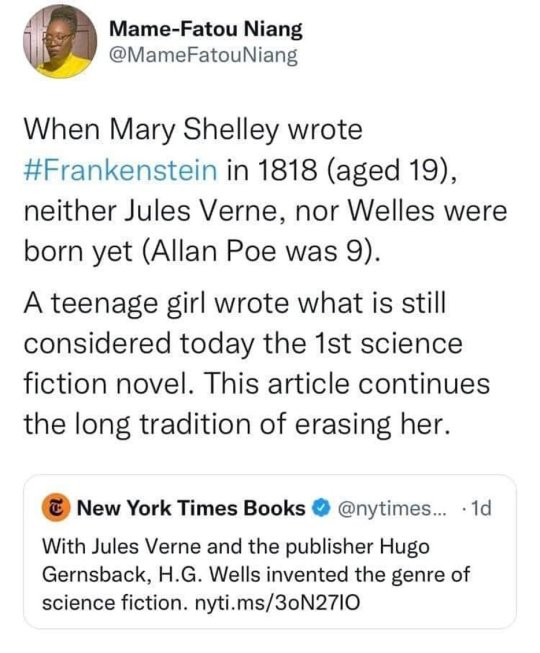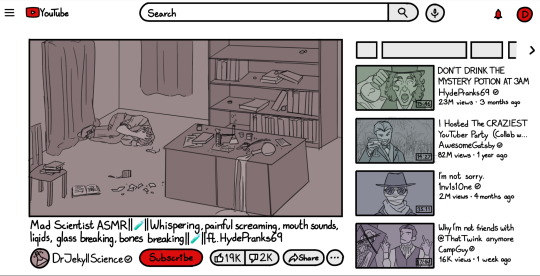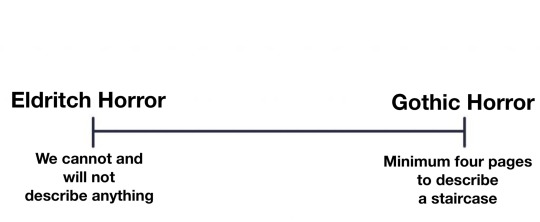#gothic literature
Explore tagged Tumblr posts
Text



Bram Stoker, Mary Shelley and Robert Louis Stevenson reading like that Edgar Allan Poe meme
edit: I drew these versions myself and it's free to share, however the original comic strip is from Kate Beaton!
25K notes
·
View notes
Text
I love this so much.
The entirety of Dracula by Bram Stoker is really just:
Dr Seward: I wish we could figure out what’s wrong with Lucy.
Van Helsing: I figured it out immediately but I’m just going to let you solve it yourselves.
Dr Seward: Or you could just tell us.
Van Helsing: Friend John :( I have known you for one thousand years and you have been one of my very good friends and best students :( Do you not trust me? Why do you not trust me, friend John? Have I ever given you a reason to doubt me? Do you not think I have a good reason for withholding vital information? :(:(:(:( Have faith in me, your very old and good friend.
Dr Seward: You’re right :(
Lucy: I love everyone so much and I’m going to tell them every day 🥰💕 also legalise polyamory wtf
Renfield: look at all my pets that I’m definitely not eating 🪰🪰🪰🪰
Dr Seward: What happened to all the birds I gave you?
Renfield, with a mouth full of a feathers: I have no idea.
Arthur: I think… I miss my wife… also how the fuck didn’t we realise Dracula’s house was right next door?
Quincey: I keep saying I’m not that smart but I’m the only one to immediately point out that something was actively taking Lucy’s blood. Brb need to go shoot a giant bat with a gun.
Mina: I am the only person keeping this shit show together. We literally would not have made it without me and no one who adapts my character seems to get that. Women are the heart of this story. I am the glue that binds this group together. I just want ONE MOVIE that understands that and values my intelligence, which is at the forefront of my character.
Renfield: I have an entire character arc but don’t expect any adaptations to show it.
Quincey: ok but what if… we shot Dracula with a gun??? Also stop fucking cutting me from all the adaptations.
Jonathan: has seen indescribable horrors, is a shell of his former self, will literally never be what he was before going to Transylvania
Dracula: oh Jonathan! 🥰🥰🧛🏻🧛🏻🥰🩸🩸🥰🥰
BONUS: everyone is constantly holding hands, especially all of the men, and talking about how they’re going to be best friends forever. The male friendships in this book are shockingly pure and the women are incredible. The Crew of Light are actually the only found family ever, I think.
#dracula#bram stoker#dracula daily#mina harker#jonathan harker#quincey morris#arthur holmwood#john seward#renfield#count dracula#lucy westenra#abraham van helsing#classic literature#horror literature#gothic literature#dracula spoilers
887 notes
·
View notes
Text

#Books#horror#frankenstein#science fiction#literature#feminism#poe#lit#gothic literature#gothic aesthetic
6K notes
·
View notes
Text

Ms. Carmilla, they could never make me hate you
#carmilla#vampire#cw: blood#digital art#artists on tumblr#gothic#gothic literature#sheridan le fanu#sapphic#fanart#will probably make stickers or keychains of this at some point
212 notes
·
View notes
Text

More classic literature YouTubers because it's so funny to me
Bonus content:




#the strange case of dr jekyll and mr hyde#dr jekyll and mr hyde#dr henry jekyll#mr edward hyde#jekyll and hyde#henry jekyll#edward hyde#the great gatsby#jay gatsby#the invisible man#the picture of dorian gray#dorian gray#classic literature memes#classic lit memes#classic literature#classic lit#gothic lit meme#gothic literature#gothic lit#oscar wilde#robert louis stevenson#h.g. wells#f. scott fitzgerald#gatsby is the jake paul of literature#leave that poor woman alone gatsby#leonardo di caprisun#props to anyone who remember that one scientist guy in tpodg who dorian forced to dispose of basils body#Seagull art#silly art#my art
2K notes
·
View notes
Text
Everybody should read this masterpiece. No, I would not elaborate. Fuck around and found out.
"Alright Mr Virga, I hear you have a new book to pitch?"
"Yes, so, its a gothic novel, something akin to Anya Seton's Dragonwyck"
"Indeed?"
"Yes, but--we make it gay"
"Oh ho! And what shall we call this, the first gay gothic novel that is akin to Dragonwyck?"

#gaywyck#gothic literature#gothic romance#queer romance#queer literature#queer community#fandom screams into the void
689 notes
·
View notes
Text

So, the Nosferatu movie was surprisingly good
#mina harker#ellen hutter#gothic lit#classic literature#gothic literature#classic lit#dracula#dracula daily#nosferatu#nosferatu 2024
4K notes
·
View notes
Text

This art killed my nerves, but I love these beautiful ladies
88 notes
·
View notes
Text
sorry im going half mad as a desi but like. the fact that heathcliff is Not Fucking White is very important to the story actually! he's treated as subhuman for having brown skin and its the main if not only reason he was immeidtaley abused by his stepfamily! hes DESCRIBED differently from the white characters too! what the fuck! he's so obviously like romani or indian or just. NOT WHITE YOU CANT JUST DO THAT. ITS 2024. THE RACISM HE SUFFERS IS NOT EVEN SUBTEXT
2K notes
·
View notes
Text

There's so much Dracula stuff out there, but not enough Carmilla ❤🧛♀️
I recently listened to the Carmilla miniseries produced by the folks over at Re:Dracula, and I was inspired to draw this Carmilla/Laura fanart😊 Surely this must be what the youth call 'toxic yuri'
#art#my art#drawing#digital art#fanart#carmilla#carmilla fanart#carmilla and laura#vampire#vampires#lgbt#sapphic#literature#books#gothic literature
80 notes
·
View notes
Text

"It was very near the turning point from which began the descent of Avernus."
from the Spanish Alma edition of Carmilla illustrated by @checanty
#carmilla#carmilla karnstein#carmilla 1872#re: carmilla#gothic romance#gothic literature#sheridan le fanu#vampires
151 notes
·
View notes
Text

I was serious about putting him in a corset btw
My man can rock some shapewear if he so desires (as did a lot of gentlemen back in victorian times surprisingly)
#I like him suffering and in pain as much as I like putting him in much more domestic situations#it really does something for me#jekyll and hyde#gothic literature#gothic lit#the strange case of dr jekyll and mr hyde#my arrrt#henry jekyll
54 notes
·
View notes
Text

There’s two ends of the horror spectrum
#horror#gothic horror#gothic literature#eldritch horror#lovecraftian#lovecraftian horror#eldritch#cosmic horror#gothic lit
105K notes
·
View notes
Text

Laura and the Baron at the end of Carmilla
#carmilla 1872#carmilla#carmilla karnstein#gothic literature#gothic romance#vampires#vampire romance#baron vordenburg#re: carmilla#re: dracula
29 notes
·
View notes
Text

“There is something at work in my soul, which I do not understand.”
I've had this vision in my mind for ages so I finally decided to take a stab at drawing a cover for one of my favourite novels⚡
#frankenstein#victor frankenstein#gothic literature#gothic lit art#frankenstiensmonster#mary shelley#mary shelly's frankenstein#my art#pigeon princess#I've been thinking about Frankenstein a lot recently
9K notes
·
View notes